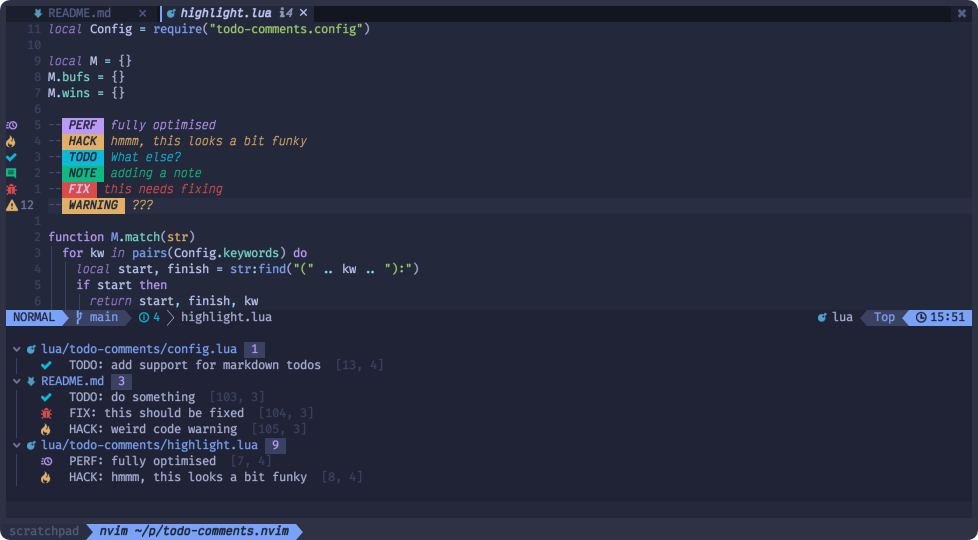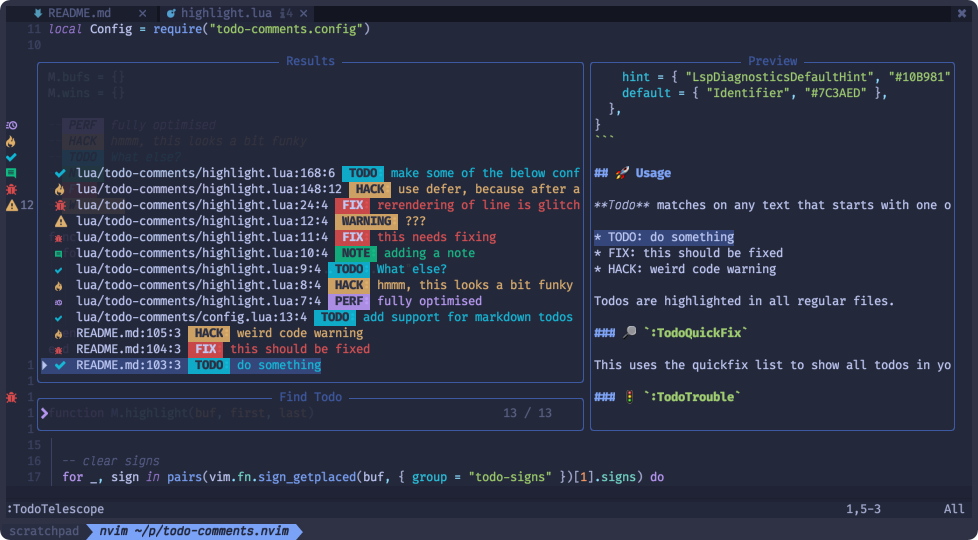todo-comments is a lua plugin for Neovim >= 0.8.0 to highlight and search for todo comments like
TODO, HACK, BUG in your code base.
- highlight your todo comments in different styles
- optionally only highlights todos in comments using TreeSitter
- configurable signs
- open todos in a quickfix list
- open todos in Trouble
- search todos with Telescope & FzfLua
- Neovim >= 0.8.0 (use the
neovim-pre-0.8.0branch for older versions) - a patched font for the icons, or change them to simple ASCII characters
- optional:
- ripgrep and plenary.nvim are used for searching.
- Trouble
- Telescope
- FzfLua
Install the plugin with your preferred package manager:
{
"folke/todo-comments.nvim",
dependencies = { "nvim-lua/plenary.nvim" },
opts = {
-- your configuration comes here
-- or leave it empty to use the default settings
-- refer to the configuration section below
}
}Todo comes with the following defaults:
{
signs = true, -- show icons in the signs column
sign_priority = 8, -- sign priority
-- keywords recognized as todo comments
keywords = {
FIX = {
icon = " ", -- icon used for the sign, and in search results
color = "error", -- can be a hex color, or a named color (see below)
alt = { "FIXME", "BUG", "FIXIT", "ISSUE" }, -- a set of other keywords that all map to this FIX keywords
-- signs = false, -- configure signs for some keywords individually
},
TODO = { icon = " ", color = "info" },
HACK = { icon = " ", color = "warning" },
WARN = { icon = " ", color = "warning", alt = { "WARNING", "XXX" } },
PERF = { icon = " ", alt = { "OPTIM", "PERFORMANCE", "OPTIMIZE" } },
NOTE = { icon = " ", color = "hint", alt = { "INFO" } },
TEST = { icon = "⏲ ", color = "test", alt = { "TESTING", "PASSED", "FAILED" } },
},
gui_style = {
fg = "NONE", -- The gui style to use for the fg highlight group.
bg = "BOLD", -- The gui style to use for the bg highlight group.
},
merge_keywords = true, -- when true, custom keywords will be merged with the defaults
-- highlighting of the line containing the todo comment
-- * before: highlights before the keyword (typically comment characters)
-- * keyword: highlights of the keyword
-- * after: highlights after the keyword (todo text)
highlight = {
multiline = true, -- enable multine todo comments
multiline_pattern = "^.", -- lua pattern to match the next multiline from the start of the matched keyword
multiline_context = 10, -- extra lines that will be re-evaluated when changing a line
before = "", -- "fg" or "bg" or empty
keyword = "wide", -- "fg", "bg", "wide", "wide_bg", "wide_fg" or empty. (wide and wide_bg is the same as bg, but will also highlight surrounding characters, wide_fg acts accordingly but with fg)
after = "fg", -- "fg" or "bg" or empty
pattern = [[.*<(KEYWORDS)\s*:]], -- pattern or table of patterns, used for highlighting (vim regex)
comments_only = true, -- uses treesitter to match keywords in comments only
max_line_len = 400, -- ignore lines longer than this
exclude = {}, -- list of file types to exclude highlighting
},
-- list of named colors where we try to extract the guifg from the
-- list of highlight groups or use the hex color if hl not found as a fallback
colors = {
error = { "DiagnosticError", "ErrorMsg", "#DC2626" },
warning = { "DiagnosticWarn", "WarningMsg", "#FBBF24" },
info = { "DiagnosticInfo", "#2563EB" },
hint = { "DiagnosticHint", "#10B981" },
default = { "Identifier", "#7C3AED" },
test = { "Identifier", "#FF00FF" }
},
search = {
command = "rg",
args = {
"--color=never",
"--no-heading",
"--with-filename",
"--line-number",
"--column",
},
-- regex that will be used to match keywords.
-- don't replace the (KEYWORDS) placeholder
pattern = [[\b(KEYWORDS):]], -- ripgrep regex
-- pattern = [[\b(KEYWORDS)\b]], -- match without the extra colon. You'll likely get false positives
},
}
Two methods are available to jump to the next/previous todo comment.
vim.keymap.set("n", "]t", function()
require("todo-comments").jump_next()
end, { desc = "Next todo comment" })
vim.keymap.set("n", "[t", function()
require("todo-comments").jump_prev()
end, { desc = "Previous todo comment" })
-- You can also specify a list of valid jump keywords
vim.keymap.set("n", "]t", function()
require("todo-comments").jump_next({keywords = { "ERROR", "WARNING" }})
end, { desc = "Next error/warning todo comment" })
Todo matches on any text that starts with one of your defined keywords (or alt) followed by a colon:
- TODO: do something
- FIX: this should be fixed
- HACK: weird code warning
Todos are highlighted in all regular files.
Each of the commands below accept the following arguments:
cwd- Specify the directory to search for comments, like:
:TodoTelescope cwd=~/projects/foobarkeywords- Comma separated list of keywords to filter results by. Keywords are case-sensitive.
:TodoTelescope keywords=TODO,FIXThis uses the quickfix list to show all todos in your project.
This uses the location list to show all todos in your project.
List all project todos in trouble
Use Trouble's filtering: Trouble todo filter = {tag = {TODO,FIX,FIXME}}
See screenshot at the top
Search through all project todos with Telescope
Note
The same can be done with :TodoFzfLua


